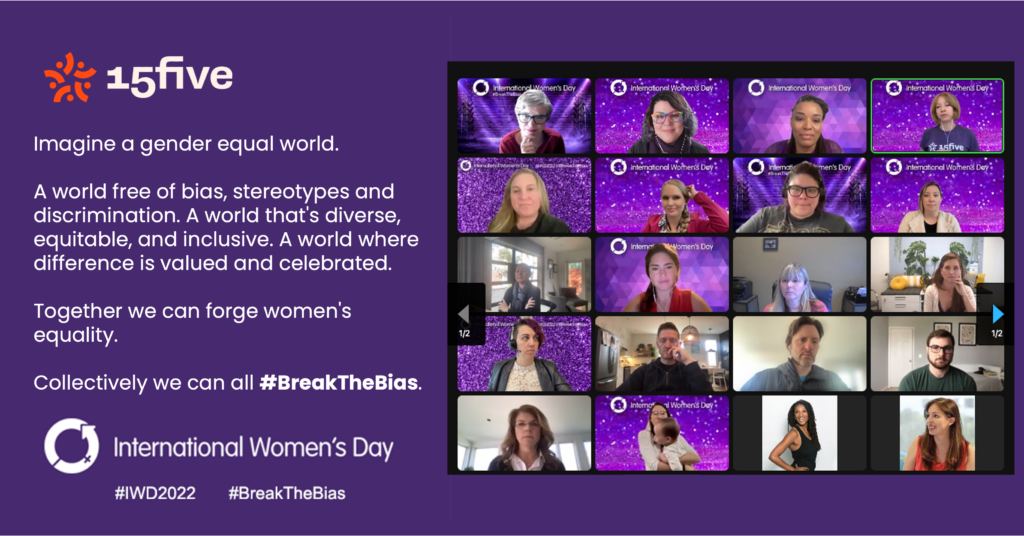The Link Between Employee Feedback and Gender Equity
March is Women’s History Month here in the United States, and on March 8th, the world recognizes International Women’s Day. As we collectively celebrate the accomplishments of the women in our lives, it’s also a great time to ask ourselves how we can continue to make our organizations more equitable for women.
That’s why Cara Pelletier, the new Senior Director of DEI at 15Five, organized a panel for International Women’s Day where employees could come together to deepen our understanding of the issues, challenges, choices, and triumphs that women experience in the modern workplace.
Read on as Cara explores the link between employee feedback and gender equity, and how leaders can improve the quality of the feedback they provide to women and level the playing field for all employees.

According to McKinsey’s 2021 Women in the Workplace report, women across all industries and roles are not being promoted at the same rates as men, with only 86 women promoted to manager for every 100 men at the same level. And in the technology industry this number drops to only 52 women being promoted to manager for every 100 men. McKinsey calls this the “broken rung” on the career ladder, where a lack of advancement in a woman’s early career can have a profound impact on her overall career trajectory and outcomes.
One of the reasons that women don’t advance as quickly as men is bias in the performance review process. A 2016 Stanford study compared the feedback given to men and women and found that women were less likely to receive specific, actionable feedback tied to business goals and outcomes. Women were more likely to receive vague praise, such as “you had a great year!” without explanation of which actions were most valuable and how they positively contributed to business outcomes.
In addition, this study found that women were more likely to receive negative feedback about their communication style – “she’s too aggressive” – while men were more likely to receive feedback about how to improve their technical skills.
Interestingly, the study showed that the manager’s gender did not impact the quality of feedback given to women. Both men and women were more likely to give vague feedback to women, and managers struggle with providing feedback to employees who are of a different gender, race, or age.
When women do not receive specific, actionable feedback, it makes it harder for them to refine their skills and develop new ones. Not tying feedback to business outcomes also has the add-on effect of making it more difficult for leaders to advocate for a promotion or a raise. Both contribute to the gaps in women’s advancement in the workplace and the overall underrepresentation of women at senior levels in most organizations.
What can leaders do to improve the quality of the feedback they provide to women and level the playing field for all employees?
1. Establish criteria for “excellent performance” prior to writing employee reviews. Ensure that ratings are tied to measurable and specific outcomes, and apply the criteria fairly to all employees.
2. Focus your feedback on outcomes, not feelings. One of my favorite feedback models is SBI: Situation, Behavior, Impact. Describe a specific situation, describe the observable behavior that the employee demonstrated, and then describe the positive or negative impact that behavior had on you and others.
3. Ask yourself, can my employee take action on this feedback? Is it obvious what next steps they should take? If not, rephrase your feedback so that next steps are clear. Instead of “You had a great year,” try “This year you achieved 104% of your quota and a 90% positive customer rating. In the upcoming year, you can work to improve your customer rating by improving your product expertise so you can close challenging technical cases on your own without having to escalate to tier 2 support.”
4. Carefully choose your words, understanding that the same word applied to different people can be interpreted differently. The word “ambitious” is usually seen as a positive attribute for men but has a negative connotation for women. The word “aggressive” might be seen as positive for white men, but perpetuates damaging stereotypes when applied to Black employees.
5. Don’t shy away from offering developmental feedback to employees, even when it feels uncomfortable or you are concerned how they might respond. All employees deserve honest feedback that allows them to develop and grow.




